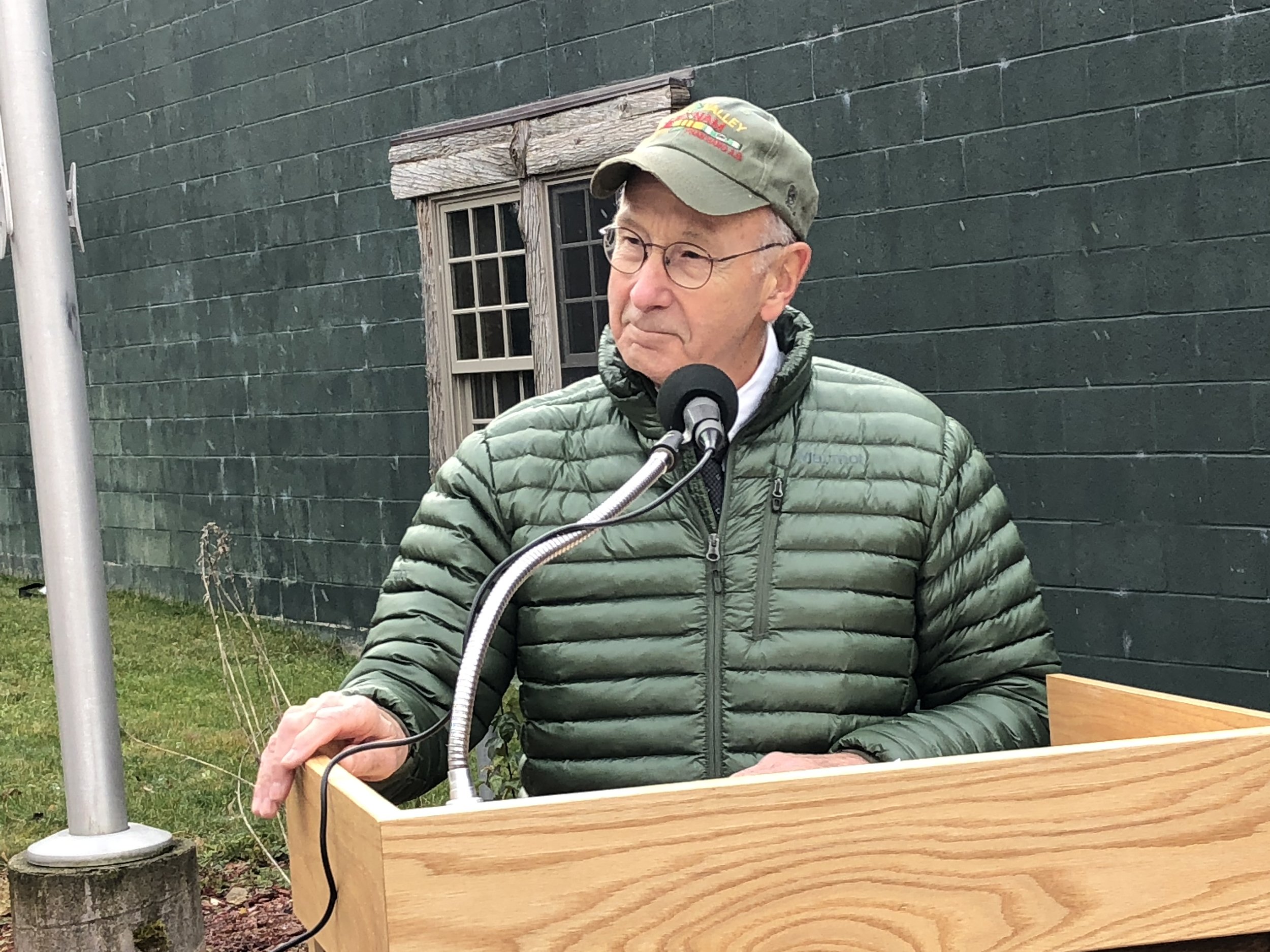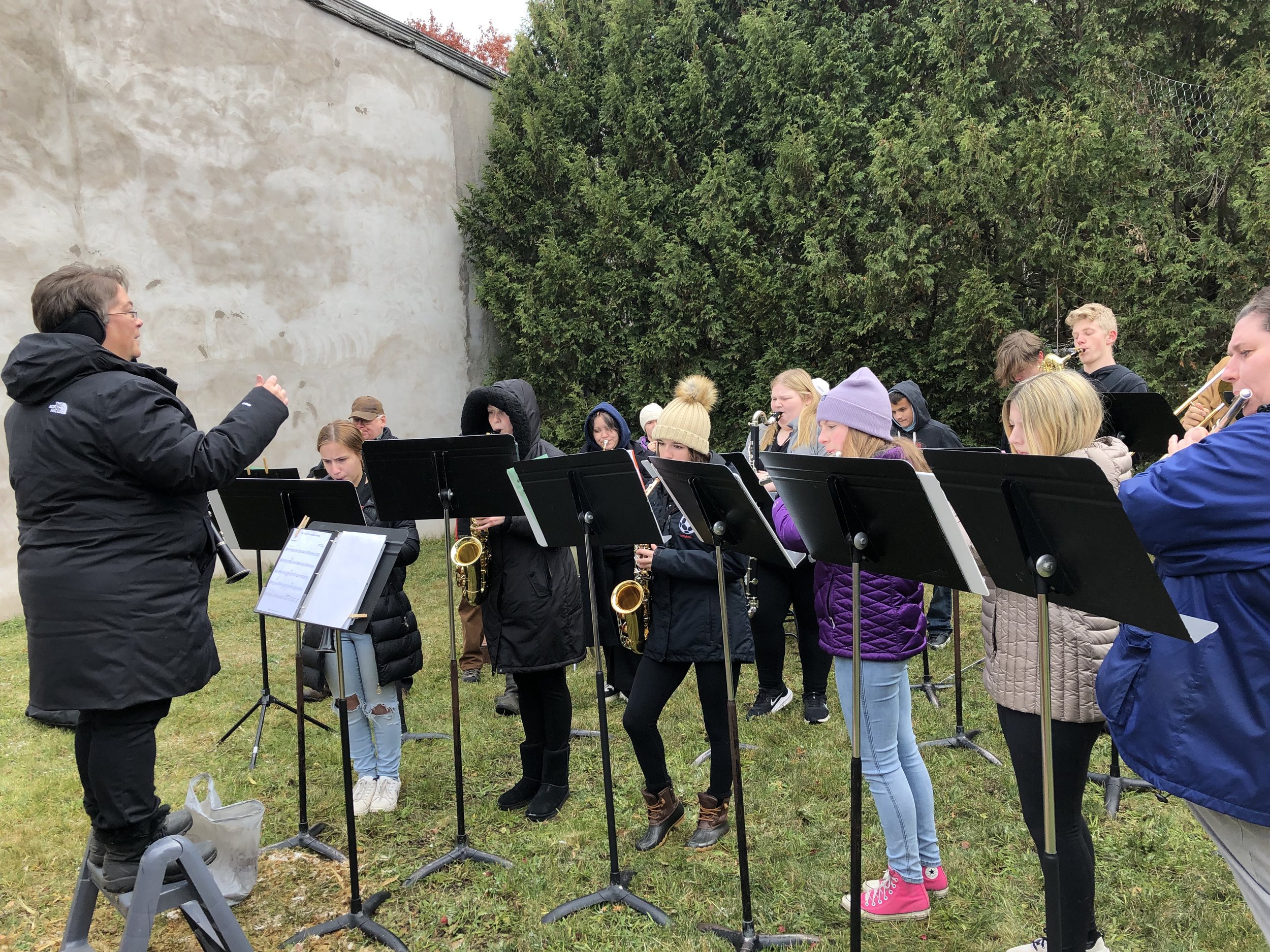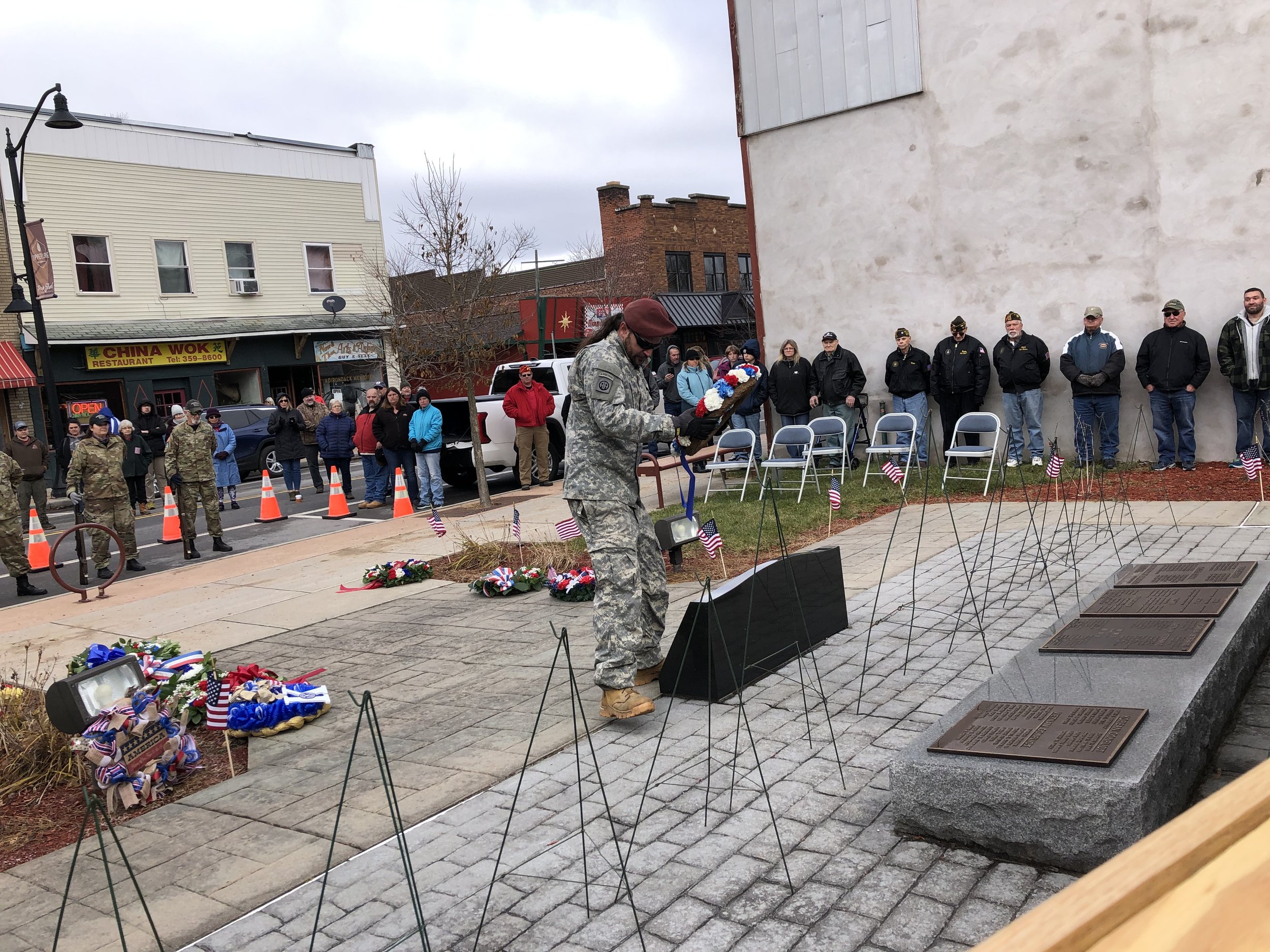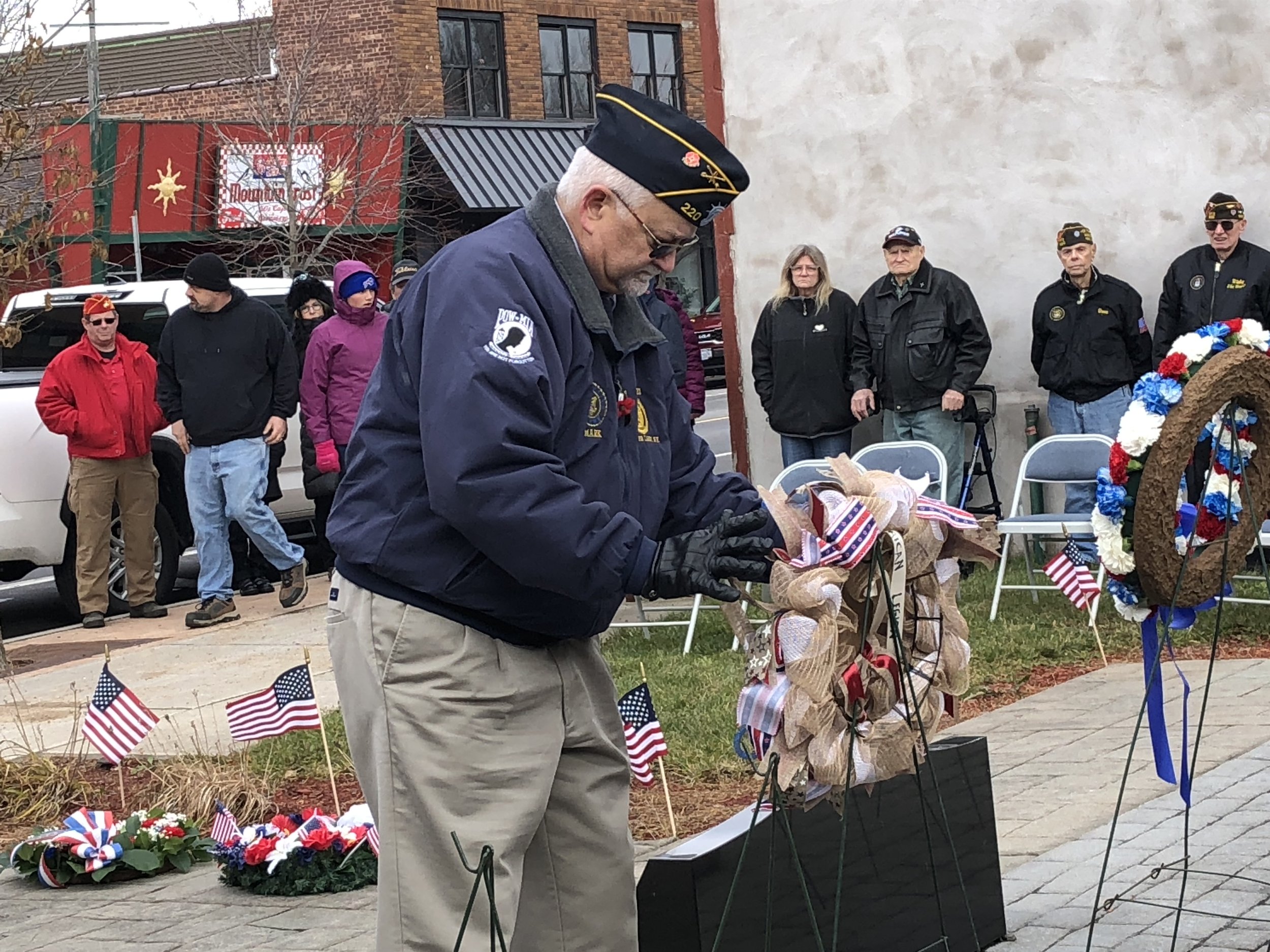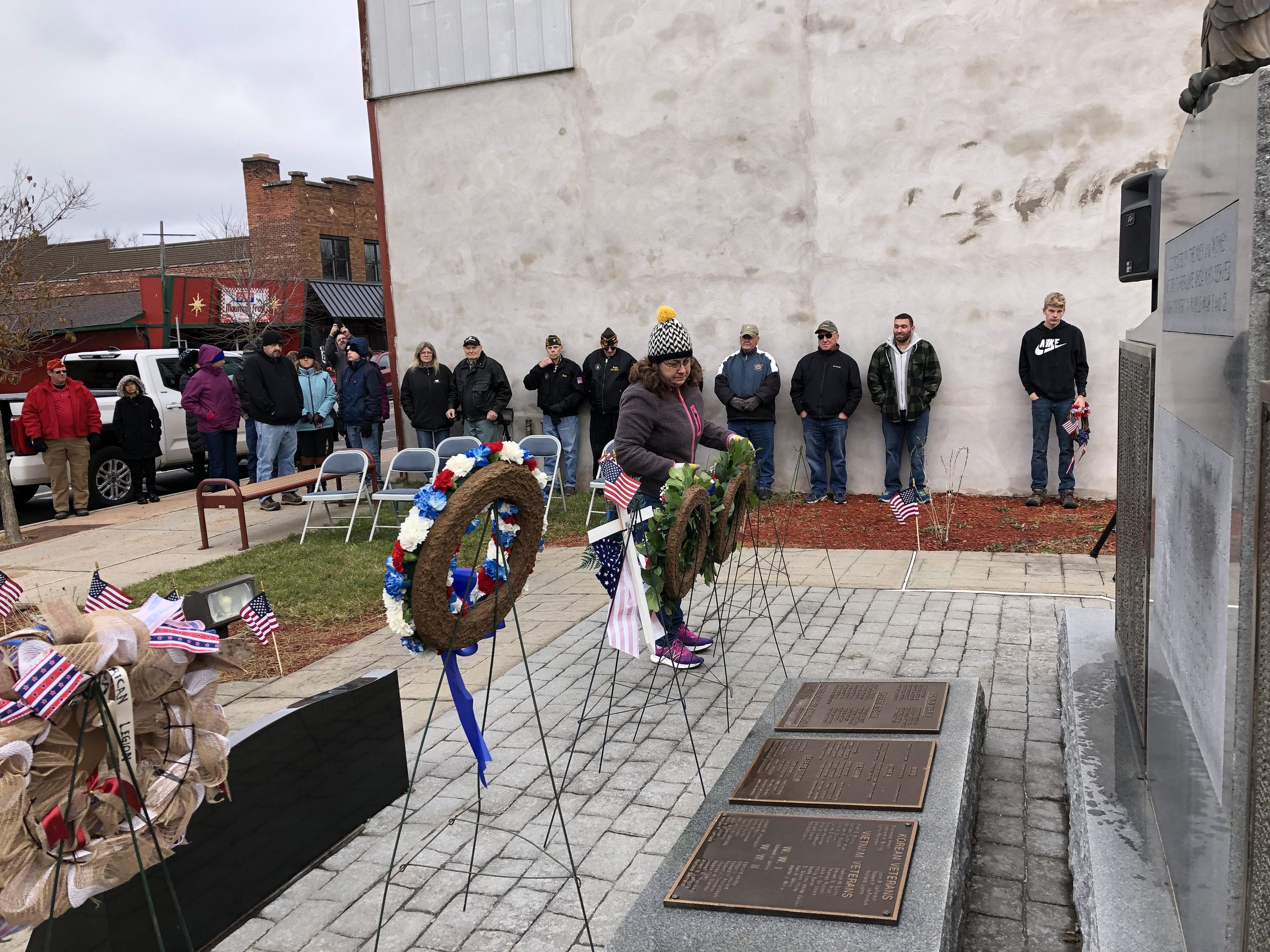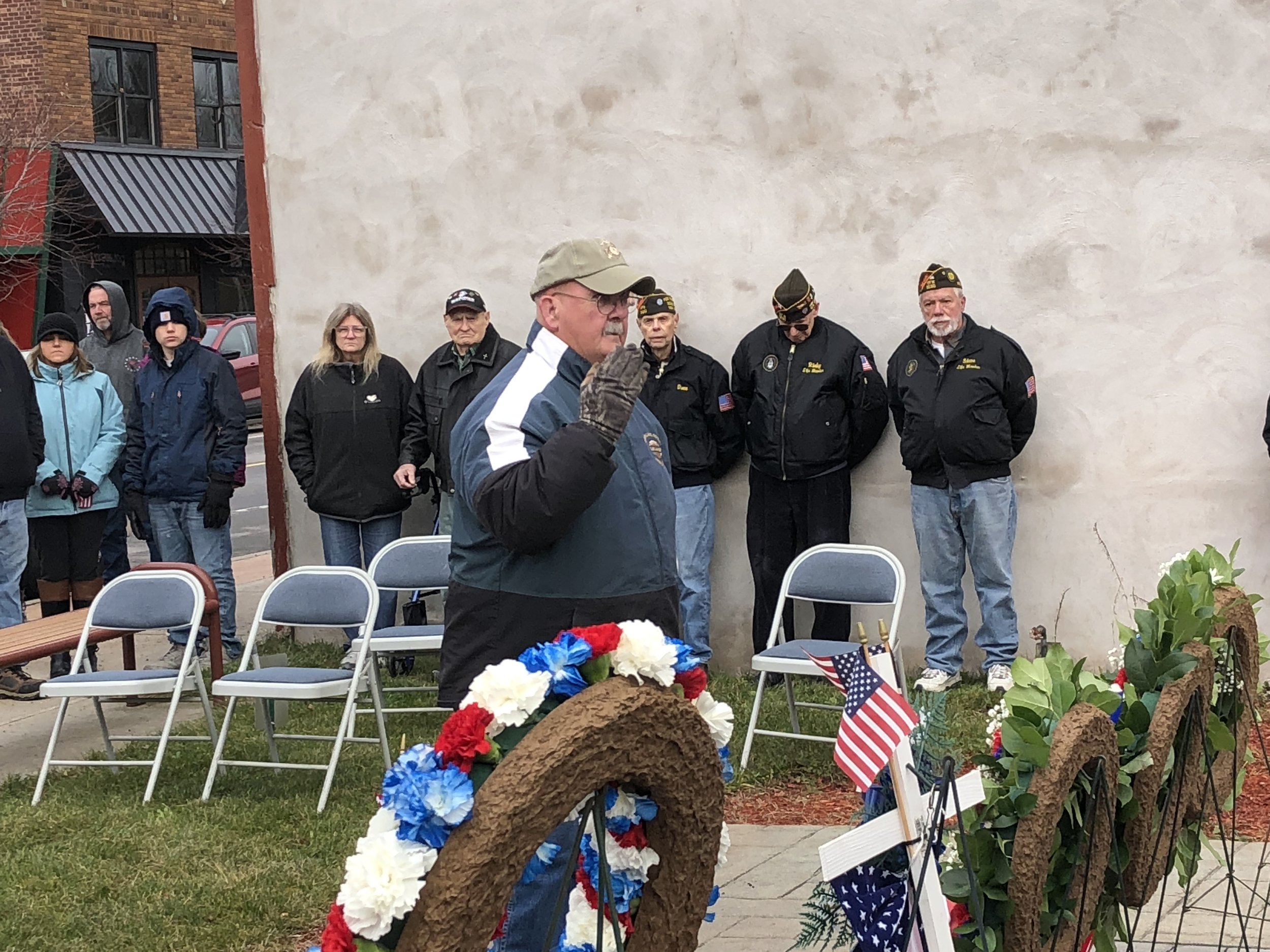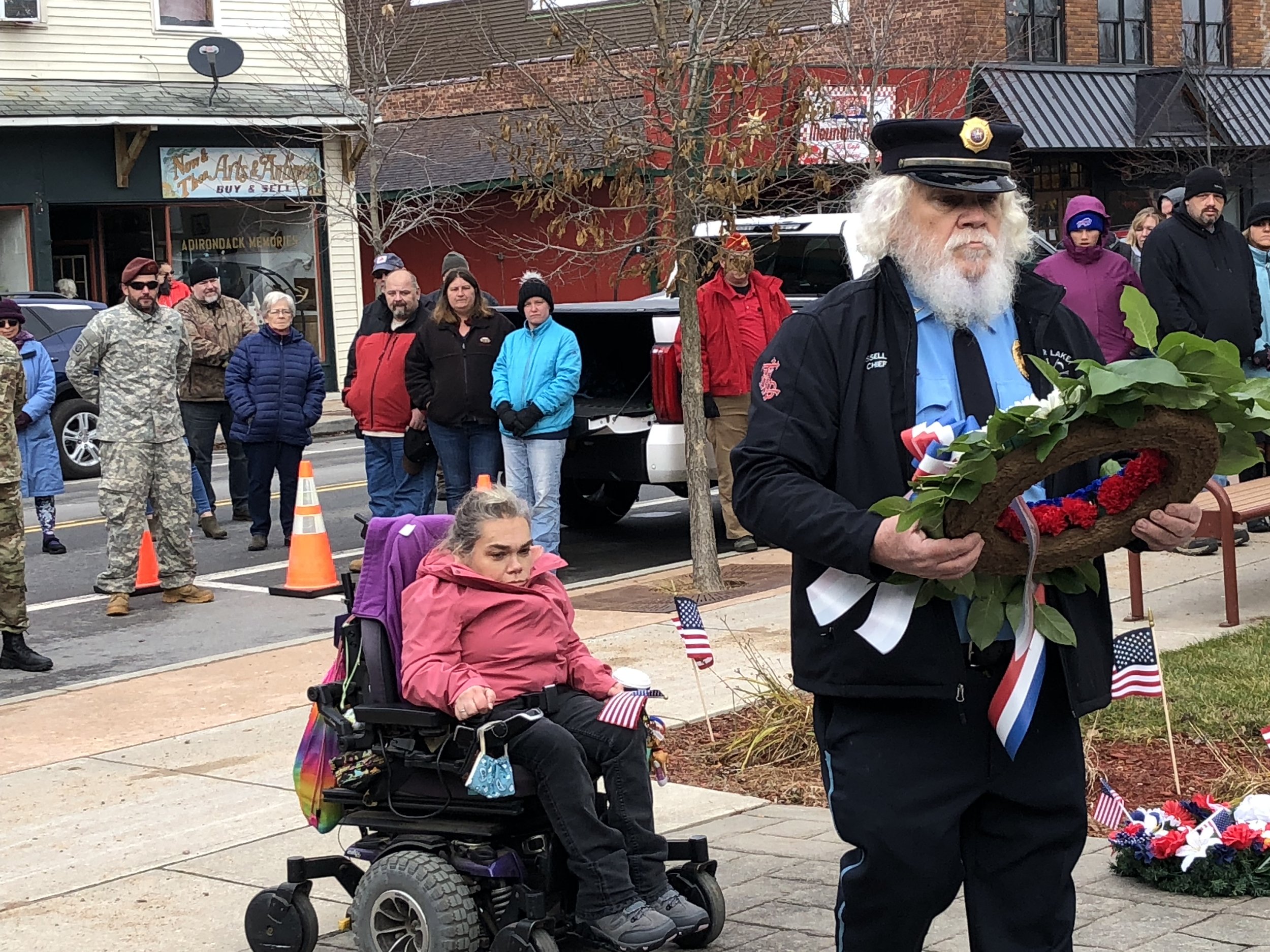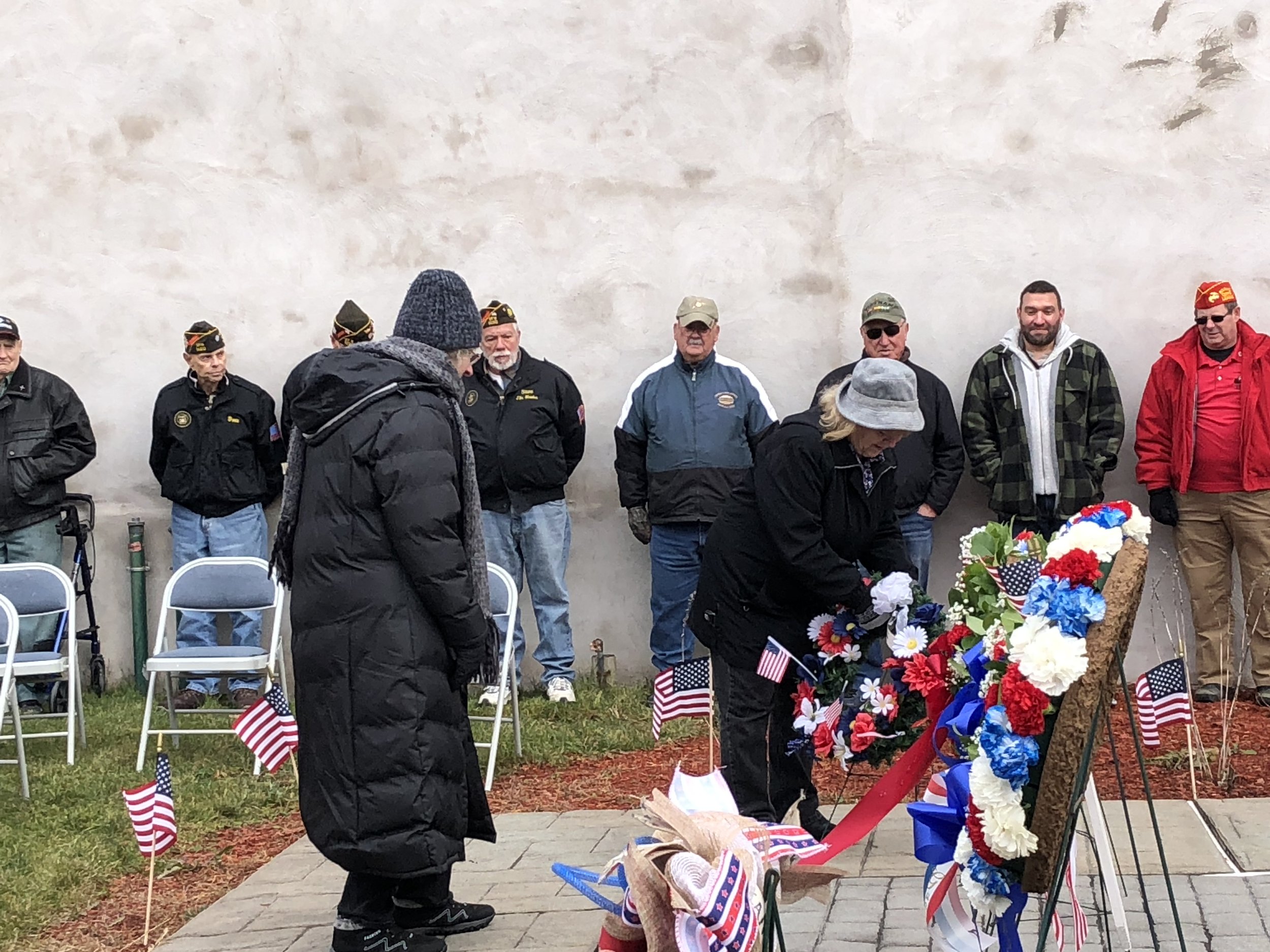Veterans Day speaker Jim Kucipeck delivers moving, heart-felt message about facts of Vietnam War
by Dan McClelland
Mark Moeller, one of the community’s most active veterans and the MC at Saturday’s Veterans Days ceremony at the veterans park had the honor of introducing the guest speaker- Tupper native and community leader, James Kucipeck.
“Jim’s a baby boomer, born in 1946 to Peter and Gladys Kucipeck. He attended Tupper Lake High School, graduating in 1965, where upon he entered the U.S. Air Force. Jim served two tours overseas, one in Kusson, Korea and then in Fom Rong and Fu Pat in South Vietnam in 1967-68.
“Jim went on to attend college though the G.I. bill, first at North Country Community College, and then SUNY Albany where he completed his bachelor’s degree. He continued at SUNY Albany to win his master’s degree in education. Jim taught business and technology courses at Tupper Lake High School for 31 years, retiring in 2004. He served two terms as town councilman from 1980 to 1987. He was also a member of the Tupper Lake Library Board and served terms as its president. Jim served for a time on the town’s board of assessment review and on the board of directors of the Adirondack Regional Federal Credit Union.
“Jim’s been married for 54 years to Betsy Rule and they have three daughters.
“So to sum it up Jim is a native born Tupper Laker and is a Vietnam veteran. He’s an educator who taught our children throughout his career. He’s a community leader. He was my wife’s favorite teacher and just all-round good guy.”
Mr. Kucipeck began by thanking the crowd for coming out on a cold morning.
He also thanked the American Legion post, sponsor of this year’s event for his invitation to speak, the VFW post for its organizational help and Pastor Wilburn for his words.
The day’s speaker also thanked the leaders of the village and town- both past and present. He wished the Marine Corp “a happy birthday.”
He made a little fun of the ragged Vietnam cap he wore that morning “because we were an irreverent lot!”
“Right, Leon?” he said, addressing retired Marine and village leader, Leon LeBlanc, who was standing along the State Theater wall that morning with about 12 other local veterans. Deputy Mayor LeBlanc also served in Vietnam.
Mr. Kucipeck began:
“After reading “The Good War,” by Studs Terkel about the experiences of people during World War II, I thought of the experiences of my generation during the Vietnam War.
He said he hoped his comments that day would reflect the before, during and aftermath of that war.
“This is not only my story, but a collection of stories of my buddies, friends and co-workers who served in Vietnam.
“The book, The Good War, is based on the premise that World War II united people around the world against Germany and Japan. Certainly no war is good. Congress declared war on December 11, 1941 and our mothers, fathers, aunts and uncles met the call and we know the result: victory in the spring of 1945.
“Congress, by contrast, never declared war in Vietnam. I’ve heard it said that Vietnam was not a real war. I beg to differ!
“There were 58,220 men and women who came home in coffins. There were 150,000 wounded and 1,600 missing in action. -And all the rest of us left mentally and emotionally scarred!
“The Vietnam War was so controversial that we were disrespected after we came home. What I’m about to tell you are not war stories, but who we were before, during and coming home. It’s a frank discussion we all need to have about what Vietnam did to us!”
He continued with what he called a few facts about the war.
“The first U.S. involvement in Vietnam and southeast Asia was in the 1950s, when the average Vietnam vet was only ten years old. The first U.S. troops were Marines who landed in DeNang on March 8, 1965. Most of us were still in high school!
“There were two million, seven hundred thousand men and women who served in Vietnam. Only 850,000 are still alive today. The average age of them is 77.
“We are dying at a rate of 390 each day!
“The first American was killed in Vietnam in 1961. I was a sophomore in high school. The last American was killed in Vietnam on April 29, 1975- the last of the 58,220 American who were killed in that war.
“The oldest man killed was 62 years of age. The youngest man killed was only 15. Five more were killed who were only 16 years old. They lied about their age to join.
“I want you to think about that and look at the band members here who are all about 15 or 16 years old,” he told the crowd that day.
“The average age of those who were killed was 23. I turned 21 there.
“In 1967 and 1968 when I was there, there were 549,000 men and women serving there- the largest number of any time during the war.
“Seventy-six percent of those who were there were from lower-middle class or working class families. Sixty-six percent of those were volunteers. Seventy percent of all those killed in the war were volunteers. There were 59 women killed in Vietnam...not many people know that.
“Nine hundred and 97 who served were killed on their first day in Vietnam. There were 1,448 were killed on their last day they were to serve there. The last combat troops left Vietnam on March 29, 1973.
Saigon fell on April 30th, 1975, approximately 10 years after the first troops landed.
“I know that statistics are boring, but you must know the facts to understand that it was a real war.
“I arrived in Vietnam June of 1967, coming directly from a 13-month tour in Korea and landed at Tan Sanh Nhut Air Base in Saigon. It was 90 plus degrees F. and 80% plus humidity. That was typical of all of Vietnam from the Mekong Delta in the south to the Demilitarized Zone in the north. I spent the first night listening to incoming rockets and mortars and watching our aircraft rain down fire on the Viet Cong.
“ The next morning, we moved out around the country to places with mysterious sounding names like Long Binh, Cu Chi, Phu Cat, Phan Rang, Kontum, the Central Highlands, Can Tho, Ca Mau, and to the countless and nameless fire bases around the country. The Marines typically went up country to Danang, Phu Bai, Chu Lai, Hue’ and Quang Tri. I caught a flight down to Phan Rang, my duty station for the next 12 months.
“In my next comments, I am only going to use the first name of my buddies, school chums and co-workers and where they were located. I am sure that I will miss some but that was not intended as there are 184 names on the memorial (behind me). Most of these guys I grew up with, lived here, and/or worked with.
“Mike, Leon, Wayne, Craig, Johnny, Terry, Rudi, and Pierre were with the Marines up around the DMZ, Phu Bai, Chu Lai and Khe Sanh.
“George was down in the Mekong Delta.
“Art and Eddy were up country flying choppers.
“Phil was at Long Binh.
“We lost Steve Valliere in 1966, up country with the Marines south of the DMZ.
“Danny was shot down while flying in a chopper. Mike was with the Wolfhounds around Cu Chi. Bobby and Jeff were with the 101st Airborne around Phu Bai.
“Barry got hit while on patrol around Cu Chi. Craig and Pierre were wounded while on patrol with the Marines up North around the DMZ. Glen was with the Navy was out in the Gulf of Tonkin with the 7th Fleet. Neil and Charlie were with me in Phan Rang and Phu Cat.
“One of my buddies, and I won’t even mention his first name, was on missions outside of the borders of Vietnam- in Laos, Cambodia, and North Vietnam.
“I was located at 2 separate places, Phan Rang and Phu Cat.
“Wayne Soucy, a high school friend, and I were in the same place for a period of time at Phan Rang. Incidentally, Wayne was in Vietnam twice.
“I think by now that you realize that the entire country of Vietnam was at war, a guerrilla war, and it was all around us!
“But who are these Vietnam vets, really?
“We are ‘boomers- Baby Boomers’, born between 1946 and 1960, the children of WW II vets who won the “Good War!”
“We came of age during the 60’s. It was a heady and exciting time to grow up. Tupper Lake was a thriving and bustling community. We were all about part-time jobs, playing sports, going to the beach, it was babes, the Beatles, the Beach Boys, muscle cars, going to the movies, hanging out at the “A” (the Altamont Dairy Bar), hanging out on the school wall, dances, and the best damn music ever!
“All of that changed for us in August of 1964 with the Gulf of Tonkin incident, a clash between the North Vietnamese and the U S Navy- the discussion of which I will leave to the historians to debate.
“Under President Johnson, Marines landed combat troops at Danang on March 8th, 1965. Most of my generation was still in high school. I graduated in June of 1965.
“After high school, some of us were drafted into military service, some of us enlisted in the military, some got medical deferments to avoid the draft, some got married to avoid the draft, some protested and burned their draft cards, some went to Canada, and others by the “luck of the draw” never did anything and stayed home.
“One close friend, who on the day he graduated from high school, left for the Marine Corp. One year later, to the day, he was in Vietnam. You might say it was his senior class trip….sad!
“I know at this point you would like to know what it was like during our time in Vietnam. Everyone had a different experience. I said early on that there would be no blood and guts war stories. Combat vets have their own stories and probably will not share them with you. Support personnel like me will share a story or two.
“Vietnam is a small country that was totally at war from the DMZ to the Mekong Delta and included Laos and Cambodia in which a secret war took place unbeknownst to the American public. Of course, we bombed North Vietnam from Thailand, and Guam and from the Gulf of Tonkin by the 7th Fleet. We bombed the Ho Chi Minh Trail which ran from North Vietnam, into Laos, Cambodia and finally into South Vietnam. We bombed the Sihanouk Trail out of Cambodia. Battles took place in the Central Highlands, along the borders with Laos and Cambodia, down in the MeKong Delta, in the jungles, in cities and small villages across the country. There are thousands of heart-breaking stories that are shared between vets and not shared with you. Countless books have been written about the Vietnam War, for and against, and about that war.
“I must tell you that I was a non-combatant. I worked with explosives, rockets, and napalm. It took 10 to 15 personnel to support every single pilot and combat soldier in Vietnam. As far as my part in the war, I was stationed at Phan Rang and Phu Cat. I supported Air Force missions that flew ground support for our combat troops, interdiction missions along the Ho Chi Minh Trail. We bombed Vietnam and surrounding countries 24/7. I was a ‘buck sergeant’, crew chief, in charge of five GI’s and 10 Vietnamese Nationals. We assembled explosives, 500-pound bombs, napalm, rockets, and everything else that exploded. We worked 12 or more hours a day and longer if necessary, and during TET, the Vietnamese Lunar New Year, around the clock, to support our missions. We assembled and flew hundreds of tons of munitions a day and we were only one of 10 air bases in South Vietnam.
“I have tried to convey this to you and help you understand what it was like to be there, but that was only my experience and everyone who was there has their own story to tell.
After a year in Vietnam, we were finally going home. The 1st Shirt (1st Sergeant) or “Top” called you in and told you to ‘stand down, turn in your gear, pack your bag, you are going home!’ At that point you had to catch a ride via a truck, chopper, or plane to Danang, or to Saigon or to Cam Ranh Bay for the “Freedom Bird” and home.
“One day in Vietnam and the next moment on a flight back to the ‘World’. No time to decompress! Our spirits were so high that we did not need jet engines to lift off. Once airborne the pilot announced that we had cleared Vietnamese airspace. You cannot believe the range of emotions expressed after twelve long months, hooting, hollering, tears, and dead silence by some about going home and buddies left behind and those who would never make it home alive. Some of us landed at Travis AFB near San Francisco or McChord AFB near Seattle. We did not expect a parade, nor did we get one!
“What we got instead was unexpected, met by protesters carrying signs and heckled with the word: ‘baby killer. We were spit upon, had urine thrown on us, as well feces! Some of us were even told not to wear our uniforms while traveling home to protect us from being harassed.
“For me it was quite different. It was June 4, 1968, and no one paid any attention to us as Robert Kennedy had just been murdered and all eyes were glued to the TVs in the airports. I flew from Seattle, to Chicago, to New York City, finally to Albany and to catch a bus to Saranac Lake. The trip home was in stark contrast to the landscape of Vietnam. We traveled up Rte. 9, hitting every little small town along that rural route. I was mesmerized at our beautiful Adirondack landscape.
“I was in a world of my own as I was overseas for 25 months in Korea and Vietnam, hoping nothing had changed at home.
“Reality soon set in as the bus driver let me off in Saranac Lake at the main intersection. I grabbed my bag and stepped off the bus to 50-degree temperatures after leaving Cam Ranh Bay at one hundred degrees F. the day before.
“What followed is still vividly clear to me to this very day. I was standing on the bridge in Saranac Lake, hitch hiking home when a driver stopped, and I opened the door. He asked me where I was coming from and I, of course, replied: Vietnam. At that point he asked me ‘how many babies did you kill’ and uttered an expletive at me and drove off. I was dumfounded and thought: ‘Welcome home Jim!’
“Another car approached and I was reluctant to open its door, but it was getting late, and I was freezing. The driver did see what just occurred seconds earlier and I recounted my story. He was an off-duty state police officer, he told me to get in and took me right to the door of my home.
“My parents greeted me, but it was not what I expected. I am not sure what I expected, though, to be honest. I felt as if they thought I had gone out of town for the day. I had been gone for 25 months. Home was not the same anymore and never would be. No one, family and friends included, wanted to talk about Vietnam and what it was like. There was little or no emotional support from my community!
“Only returning Vietnam vets home at the same time congregated at the local bars would talk about Vietnam and all that happened to us. People felt uncomfortable around us as we spoke of Vietnam and the war. They did not understand, they weren’t there!
“Our Vietnam experiences, for some, brought on Post Traumatic Stress Disorder (PTSD). Some of it can be expressed as anger, anxiety, depression, rage, crying, night terrors, survivors’ guilt, startle response, panic, irritability, just to name a few. If you want to know more of the manifestations of PTSD, research it!
“Vietnam vets have a saying: ‘you can leave Vietnam, but Vietnam never leaves you!’ We have ‘triggers’ that evoke emotions and memories, sights, and sounds that take us back to a time and place in Vietnam. Triggers like the sound of a ‘chopper’, helicopter to you, loud explosions heard during Fourth of July celebrations, 60’s music. Incidentally, the iconic anthem of the Vietnam War is the song ‘We gotta’ get outa’ this place’ by the Animals. It takes me back to Vietnam in a heartbeat. A label in my clothing, ‘Made in Vietnam’, does too...how ironic!
“As 70 year olds, all we are left with are memories, and whether we admit it or not, PTSD, and the effects of Agent Orange. Vietnam was a traumatic experience in our lives and left an indelible mark on our psyche. I have PTSD, Post Traumatic Stress Disorder. I did not know that I had it until a friend of ours pointed it out. Once diagnosed, I spent 18 months in therapy, twice per month, with a VA therapist. I am better now; I know how to manage it! My ‘shrink’ told me that I had to talk about it, and this is part of the reason that I am doing this presentation. I must thank my wife of 54 years, Betsy, and my daughters Ann, Julie and Mary Kay for putting up with Vietnam. I love you!
“PTSD is not the only thing that Vietnam gave us. It exposed us to Agent Orange! The military called it Operation Ranch Hand! It is a defoliant sprayed by planes, choppers, trucks and by hand to deny the enemy of their hiding places. We were all exposed to it, some more than others. We wallowed in it, it was in the air, it was in the mud and dirt, it was in the dust, it was where we slept, and in our food. Eleven million gallons were sprayed over twenty million acres. Approximately 2.7 million Vietnam vets were exposed it and genetically to our children. The irony of it is the government knew early on that AO was potent and dangerous.
“There is a lengthy list of medical issues associated with Agent Orange: heart issues;
cancers (we lost Wayne Soucy a number of years ago to cancer from AO), Diabetes,Peripheral neuropathy, birth defects, hypertension, Parkinson’s disease, thyroid issues and many medical terms I cannot even pronounce.
Plus some medical issues they are just discovering.
“For me, my medical condition from AO is Peripheral Neuropathy. it is in my lower legs and feet.
“I have spoken to you about Vietnam from my own perspective and that of my brother Vietnam vets. I hope that you understand a little bit more about us and what we went through, about coming home and how we were treated and what Vietnam did to us. These are my own experiences and recollections and experiences of my brother vets who were willing to share some of their own stories with me.
“In closing I want to share with you the lyrics of a song recorded by Charlie Daniels, ‘Still in Saigon,’ that sums up the Vietnam experience for some veterans. I have taken a few liberties with the lyrics of this song, and I read it as a poem.
“Got on a plane in 'Frisco And got off in Vietnam I walked into a different world The past forever gone I could have gone to Canada or I could have stayed in school But I was brought up differently. I couldn't break the rules 13 months and fifteen days. The last ones were the worst. One minute I'd kneel down and pray And the next I'd stand and curse .
“No place to run to where I did not feel that war. When I got home I stayed alone; and checked behind each door ; Cuz I'm still in Vietnam I am still in Vietnam in my mind! The ground at home was covered in snow; and I was covered in sweat! My younger brother calls me a killer and my daddy calls me a vet! Everybody says I'm someone else; And I'm sick and there's no cure! Damned if I know who I am. There was only one place I was sure; When I was still in Vietnam . I am still in Vietnam in my mind ! Every summer when it rains I smell the jungle, I hear the planes. I can't tell no one, I feel ashamed; Afraid someday I'll go insane ! That's been fifty long years ago And time has gone on by; Now and then I catch myself, Eyes searching through the sky. All the sounds of long ago Will be forever in my head, Mingled with the wounded cries. And the silence of the dead ...'Cuz I'm still in Vietnam, I am still in Vietnam In my mind , I am still in Vietnam Yes, I'm still in Vietnam, in my mind
“Rest in peace, Craig!
“To all of my Vietnam brothers and sisters, something that you never heard when you came home: ‘WELCOME HOME!’
“Thank you for listening!”


